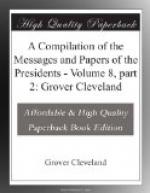In witness whereof I have hereunto set my hand, at the city of Washington, this 21st day of July, A.D. 1875, and of the Independence of the United States of America the one hundredth.
U.S. GRANT.
[From Letters and Messages of Rutherford B. Hayes, pp. 19-22.]
WASHINGTON, April 2, 1877.
The Honorables CHARLES B. LAWRENCE, JOSEPH R. HAWLEY,
JOHN M. HARLAN,
JOHN C. BROWN, AND WAYNE MACVEAGH, Commissioners.
GENTLEMEN: I am instructed by the President to lay before you some observations upon the occasion and objects which have led him to invite you as members of the commission about to visit the State of Louisiana to undertake this public service.
Upon assuming his office the President finds the situation of affairs in Louisiana such as to justly demand his prompt and solicitous attention, for this situation presents as one of its features the apparent intervention of the military power of the United States in the domestic controversies which unhappily divide the opinions and disturb the harmony of the people of that State. This intervention, arising during the term and by the authority of his predecessor, throws no present duty upon the President except to examine and determine the real extent and form and effect to which such intervention actually exists, and to decide as to the time, manner, and conditions which should be observed in putting an end to it. It is in aid of his intelligent and prompt discharge of this duty that the President has sought the service of this commission to supply by means of its examination, conducted in the State of Louisiana, some information that may be pertinent to the circumspection and security of any measure he may resolve upon.
It will be readily understood that the service desired of and intrusted to this commission does not include any examination into or report upon the facts of the recent State election or of the canvass of the votes cast at such election. So far as attention to these subjects may be necessary the President can not but feel that the reports of the committees of the two Houses of Congress and other public information at hand will dispense with and should preclude any original exploration by the commission of that field of inquiry.
But it is most pertinent and important in coming to a decision upon the precise question of Executive duty before him that the President should know what are the real impediments to regular, legal, and peaceful procedures under the laws and constitution of the State of Louisiana by which the anomalies in government there presented may be put in course of settlement without involving the element of military power as either an agent or a makeweight in such solution. The successful ascertainment of these impediments the President would confidently expect would indicate to the people of that State the wisdom and the mode of their removal. The unusual circumstances which




